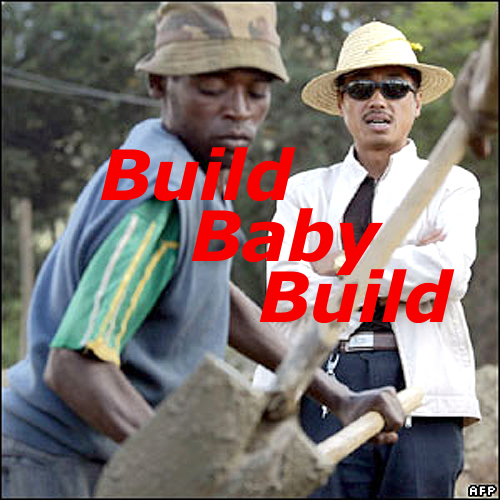 Kenya’s President Mwai Kibaki returned from China’s expo with a commitment from the Chinese to build a new Kenyan port on the island of Lamu.
Kenya’s President Mwai Kibaki returned from China’s expo with a commitment from the Chinese to build a new Kenyan port on the island of Lamu.
He called China “an important strategic partner.”
Hmm. That’s how Secretary of State just referred to Kenya: a “strategic partner.” Quite a phrase, that.
Kenya is on the threshold of a great decision. In two months the nation will vote YES or NO on a new constitution. Even getting to this point, of getting the Kenyan politicians to create a new constitution that in my opinion works well for the average wananchi was a Herculean task.
If it weren’t for the U.S., the U.K. and the EU, it would never have happened. This frontline of democracy and human rights bribed, cajoled and threatened Kenyan leaders until they finally… at the last minute … created a draft the population can vote on.
In fact when it seemed all was lost, good ole Kofi Annan jetted back into town to push the wayward leaders back on track.
So far, it has cost the consortium of good guys about $11 billion. And this is separate from ongoing initiatives like AIDS and malaria prevention, and separate from the several billion that poured into the country to stabilize it right after the political turbulence that followed the last election.
The west doesn’t want Kenya to fail. Why?
We say we don’t want Kenya to fail, because “Kenya is a strategic partner.” Untangle the myriad of meanings from that and you get to a fundamental core that “Kenya shares our values” which ultimately, of course, means that Kenya is OK with us dominating the world.
I’m not sure we would feel that way if al-Qaeda weren’t sitting next door in Somalia. We don’t seem to be quite as passionate about Senegal.
China, on the other hand, doesn’t give a hoot who is running Kenya or how they’re doing it.
“We don’t need lectures on how to govern ourselves. Lecturing us on issues that deal with governance and transparency is in bad taste,” Raila Odinga, Kenya’s current Prime Minister told Hillary Clinton last year. China never says a word about how Kenya should be governed, and certainly doesn’t care how transparent anything is.
The University of Nairobi’s Joseph Onjala warned Kenya’s leaders in 2007 that their presumption that China’s aid comes without strings attached was naive.
“…the aid appears to be very closely linked to strategic and political objectives, perhaps even more so than the aid offered by some European countries and the US. Chinese aid is …linked to the extraction and export of minerals and oil to China. These facts indicate that the aid might hurt Kenya in the long-run.”
Chinese money is much less than the west’s : about a tenth, although growing substantially year by year. And Chinese aid is nearly all for infrastructure. The west’s aid for such important things like publishing and disseminating the draft constitution, propping up Kenyan development agencies, and unloading tons of consumables like food, is all very important nourishment for a developing society, but it doesn’t last… like a road.
China’s building roads all over the place, now. See my earlier blogs. It’s mind blowing. It’s building a Kenyan railway. They just signed a deal to help build a new port. Build-Baby-Build. Just now it’s transforming a bit: it’s becoming Drill-Baby-Drill.
The west’s aid comes with enormous accountability, a huge reversal from the free-wheeling AID giving of the Cold War era. No accountability whatever to China. Now from an efficiency standpoint, the Chinese would prefer to send their own workers to build the road, which they do, and it gets built. But a lot more cash comes into Kenya to “build the road” than it takes to build the road. And China doesn’t care where it goes.
Yesterday, President Kibaki granted China 6 of the 11 potential oil spots new technology believes might exist in the Kenyan desert. Yesterday, China announced that the world’s deepest oil well (5800 meters: about 18000′ or more than three miles deep!) has been completed in Kenya’s desert. It didn’t say if there was something found way down there.
The west sees Kenya as a strategic partner for its values.
China sees Kenya as a strategic partner for oil.
Do these two “strategic partners” have anything in common? Actually, yes.